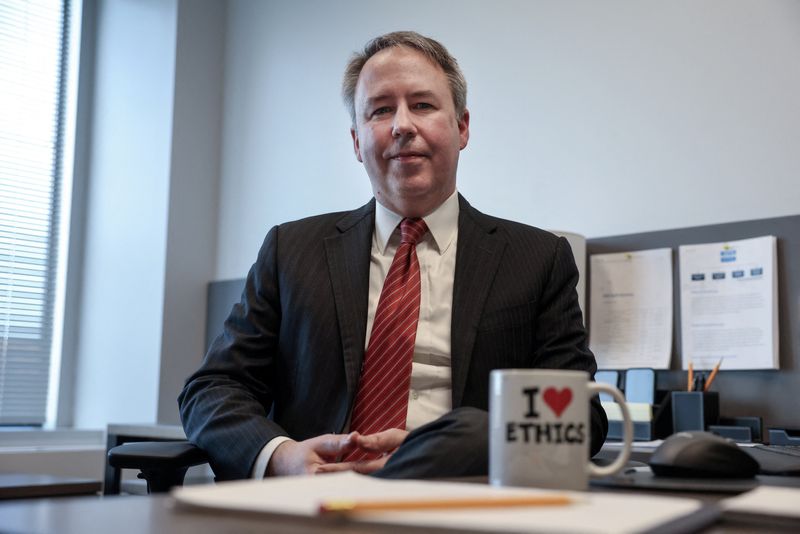By Heather Timmons and Gabriella Borter
WASHINGTON (Reuters) – The top U.S. ethics official tasked with preventing government employees’ conflicts of interest is poised to take the lead in Washington as President-elect Donald Trump’s new Cabinet and other appointees disclose their financial assets and prepare for their new jobs.
“We are in contact with the transition team and working with them,” David Huitema said recently as he sat down with Reuters for his first official interview since being sworn in on December 16. The inauguration will take place on January 20th.
Ethics experts say the director of the Office of Government Ethics (OGE) is in the spotlight with every presidential transition, but Huitema faces unique challenges ahead of Trump’s second term as he reviews a variety of business relationships for Trump, his family and advisers.
Experts pointed to the short, difficult tenure of Walter Shaub, the last person to hold the post when Trump entered the White House, and noted that several of Trump’s recent nominees have expressed disdain for the agencies that run they will guide.
After nine years as ethics chief at the U.S. State Department, Huitema will lead the OGE’s standard task of helping screen dozens of new Senate-vetted candidates and thousands of political appointees for possible financial and personal conflicts.
If he does his job well, there’s a good chance Huitema will be fired fairly quickly, Shaub warned in an open letter last month. Huitema told Reuters he had confidence in the intentions of most of the new government members.
He shared his views on ethics education and maintaining public trust, but declined to answer specific questions about the new administration. The ethics office only deals with potential government employees, he emphasized. That means outside advisers like billionaires Elon Musk and Vivek Ramaswamy, whom Trump has asked to recommend government spending cuts, will not be vetted.
Q: What exactly does the OGE do?
A: “The ultimate goal is to ensure that federal employees make decisions based on national interests and policy priorities of the administration, rather than on personal interests, particularly financial interests. … The OGE itself is a small agency with only around 75 employees. But we work with a team of about 4,000 dispersed ethics officers who work more directly with federal employees.”
An important immediate task, he said, will be “ensuring nominees’ financial disclosures and ensuring that nominees for Senate-confirmed positions meet their requirements for full disclosure of their financial interests and arrangements.”
Q. How does the financial disclosure process work for presidential candidates? A: Typically, he said, nominees for top positions fill out reports early to help the office “identify potential conflicts or steps that the nominee may need to take if confirmed so that all of that information is presented to the Senate and the Senate.” Officials are available so they have “know what they’re getting into.”
Q. What are the deadlines? When do people need to make these disclosures? A. He said nominees should file a report “within five days of their nomination.” … Our goal is to help these new officials help the Senate and do it as efficiently as possible.”
He noted that “any member of the public can request a copy” of any financial disclosure report filed with the OGE. “The idea is that the public can also play a role in monitoring conflicts of interest.”
Q. What enforcement mechanisms are in place for conflicts of interest? A: “It’s not so much a question of whether a conflict appears on the form itself, but rather whether a federal employee is ultimately engaged in work that then conflicts with his or her financial interests.”
“The Conflict of Interest Act is a criminal law, therefore the last resort is prosecution by the Ministry of Justice. Our job is to actually help employees avoid this situation…
“We will work with the agency’s ethics officers if we become aware of a potential conflict of interest issue to ensure it is addressed. Ultimately, we will also work with the Department of Justice if necessary.”
Q: What lessons have you learned as the State Department’s ethics director?
A: “Most employees, whether professional or in office, want to obey the law and act with integrity, and they appreciate the help of ethics officers…” Q: In your testimony to Congress, you said you believe that the OGE can help “fight the growing cynicism and distrust that can undermine our democratic self-government.” Can you explain? A. “We want to ensure that employees … do not act based on personal interests, particularly financial interests and personal motivations. …
“In practice, federal ethics rules may be more limited in their actual scope than people realize, so people’s assumptions that there is a specific problem with compliance with federal ethics laws may not be well founded.”
Q. What examples are there of interests that are not substantial enough to raise red flags?
A. “Financial conflict of interest laws are… fairly specific in their scope. Either you have enough shares to cause a conflict or you don’t.”
Q. Can ethics be taught? For people in the business world, interactions are often intentionally based on the question: “How can I use this to benefit myself or my company?”
A. “I hope so, because there are a lot of requirements for ethics training,” he said with a laugh. He agreed that private sector officials are used to “networking and asking, ‘What can you do to help someone so that in turn it will benefit you?’… It’s a challenge to make sure that Officials and new employees understand that expectations in government are a little different.
Q. What happens if the DOJ doesn’t take ethics laws seriously? Where does this take you?
A. “Law enforcement is an extreme, but there is enforcement at the regulatory level in terms of discipline.”

Q. The president can grant a waiver that exempts someone from conflict of interest laws, right? Can the OGE take action against this or advise against it?
A. “In some cases, the President and heads or officials of agencies…may grant exceptions,” but must consult with the OGE. He said exemptions can be granted if “the potential conflict of interest is not considered to be that significant. Ultimately, OGE needs to know when a waiver will be granted. They can be published.”





